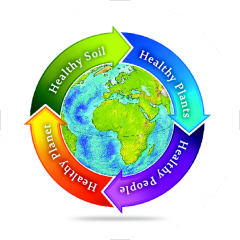Biosolids, Sewage Sludge, Soils, Composts and Soil Amendments:
Not all composts and soil amendments are equal, and not all composts and soil amendments labeled as “organic” are permitted for use on organic farms and gardens.
Many soils and composts are labeled as “organic”, but do not meet the USDA’s National Organic Program (NOP) rules for organic gardening, farming, or growing.
The term “organic” has two very different legal definitions, thus making it convoluted:
1) “Organic” in agricultural terms (relating to food production, not compost) means produce and food products conform to strict USDA/NOP organic rules & regulations, meaning growers can’t use certain products, like sewage sludge, fertilizers or synthetic substances, to grow their produce.
2) “Organic” in chemical terms simply means something that contains carbon. Much of the compost industry uses this chemical definition, since they don’t have to comply with USDA/NOP standards, and to fool consumers. Since human excrement (sewage sludge) does contain carbon, the compost industry can legally call it “organic”, though it can’t be used to grow USDA/NOP certified organic produce.
In regards to organically grown and designated produce and food products, the USDA operates the National Organics Program (NOP). The USDA regulates what can and can’t be used in organic growing. Food and produce cannot be labeled as “organic” unless in conforms to USDA/NOP regulations.
Sewage sludge (“biosolids”) is not a USDA/NOP approved amendment for organic food and produce production, it is strictly prohibited for organic growers. It is however widely used in non-organic food and produce production.
The USDA does not regulate the compost industry, only the food (ag) industry. Compost can therefore legally be labeled “organic” despite containing sewage sludge. Compost can also contain non-organic fertilizers and still be labeled as “organic”. However, compost labeled “organic” that contains sewage sludge (or prohibited fertilizers), cannot be used to grow USDA/NOP certified organic food and produce. The “organic” label is just a slick marketing tactic used by much of the compost industry to trick consumers into thinking they’re conforming to organic practices & guidelines, when in fact they’re not. Out of sight, out of mind is their method.
The commercial compost and soil (top soil, potting soil, etc.) industry has become a dumping ground for the wastewater treatment industry, in their desperation to dispose of sewage sludge.
Consider all the nasty stuff that passes through the human body, including pharmaceuticals, chemicals, pathogens, heavy metals; and the stuff that is flushed down toilets, sinks, drains, etc., like makeup, household cleaning chemicals, motor oils, antifreeze, solvents, industrial wastes, etc.
This is all ending up in wastewater treatment plants, filtered out of the water as a sludge, treated, then distributed to soil and compost makers.
In the past, communities around the world used the ocean for waste disposal, including the disposal of sewage sludge. Little attention was given to the negative impacts of waste disposal on the marine environment.
Following decades of uncontrolled dumping, some areas of the ocean became demonstrably contaminated with high concentrations of harmful pollutants including heavy metals, inorganic nutrients, and chlorinated petrochemicals. The uncontrolled ocean dumping caused severe depletion of oxygen levels in some ocean waters.
A 1970 Report to the President from the Council on Environmental Quality on ocean dumping described that in 1968, 4.5 million tons of sewage sludge (significantly contaminated with heavy metals) were dumped in the ocean in the United States.
In October 1972, Congress enacted the Marine Protection, Research and Sanctuaries Act (MPRSA), sometimes referred to as the Ocean Dumping Act, declaring that it is the policy of the United States to regulate the dumping of all materials which would adversely affect human health, welfare or amenities, or the marine environment, ecological systems or economic potentialities.
The MPRSA and EPA’s ocean dumping regulations prohibit ocean dumping of certain materials, including sewage sludge.
All that sewage sludge has to be disposed of somewhere. Municipal wastewater treatments plants, finding it too expensive to dispose of this sewage sludge in landfills, began lobbying state Legislatures to allow the inclusion of this sludge in soils and composts.
Yet now, after decades of application, several studies have shown that soils receiving human manures were enriched in antibiotic-resistant bacteria and various antibiotic resistance determinants.
One such study concluded that “The increasing prevalence of antibiotic-resistant bacteria is one of the most serious threats to public health in the 21st century.
One route by which resistance genes enter the food system is through amendment of soils with manure from antibiotic-treated animals [including humans], which are considered a reservoir of such genes”.
NatureSoil Products contain absolutely no human excrement, sewage sludges, “Biosolids, or other possibly harmful ingredients.
NatureSoil Products are 100% veganic-derived soils and amendments.
